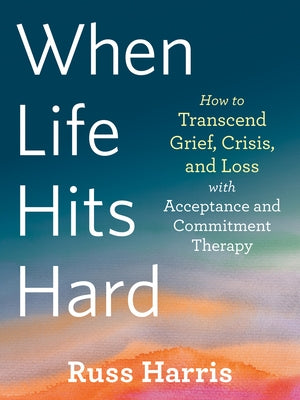New Harbinger Publications
When Life Hits Hard: How to Transcend Grief, Crisis, and Loss with Acceptance and Commitment Therapy by Harris, Russ
When Life Hits Hard: How to Transcend Grief, Crisis, and Loss with Acceptance and Commitment Therapy by Harris, Russ
12 in stock
Couldn't load pickup availability
Practical skills grounded in acceptance and commitment therapy (ACT) to help you bounce back when life knocks you down.
Whether it's the loss of a loved one or a job, the end of a relationship, a pandemic, or a natural disaster--nothing really prepares us for those moments when life hits hard and turns our world upside down. The good news is that you can move forward. There are tools you can use to find your way back from despair and live a fulfilling life.
In this candid self-help guide, psychotherapist Russ Harris offers powerful and doable skills grounded in evidence-based ACT to help you recover from grief, loss, and crisis; transcend your pain and suffering; and build a rich and meaningful life--even in the face of adversity. You'll also find tools to help you deal with painful memories, create your own healing "grief rituals," and transform difficult emotions into unexpected allies.
Finally, you'll learn how mindfulness and self-compassion can help keep you grounded, even when it seems like your world is in free fall. If you're ready to start building the resilience needed to heal from loss or thrive in the face adversity, this guide will show you how to get there, one step at a time.
Author: Russ Harris
Publisher: New Harbinger Publications
Published: 08/01/2021
Pages: 224
Binding Type: Paperback
Weight: 0.60lbs
Size: 7.90h x 5.90w x 0.60d
ISBN: 9781684039012
About the Author
Russ Harris is a medical practitioner, psychotherapist, and best-selling author of The Happiness Trap--which has now been translated into thirty languages and sold more than one million copies. Russ is one of the world's leading authorities on acceptance and commitment therapy (ACT), and has trained over 50,000 health practitioners in the approach. In 2015, he wrote an ACT protocol for the World Health Organization (WHO) to use in refugee camps--and their research shows this brief intervention leads to significant improvements in post-traumatic stress disorder (PTSD) and depression.
Share


